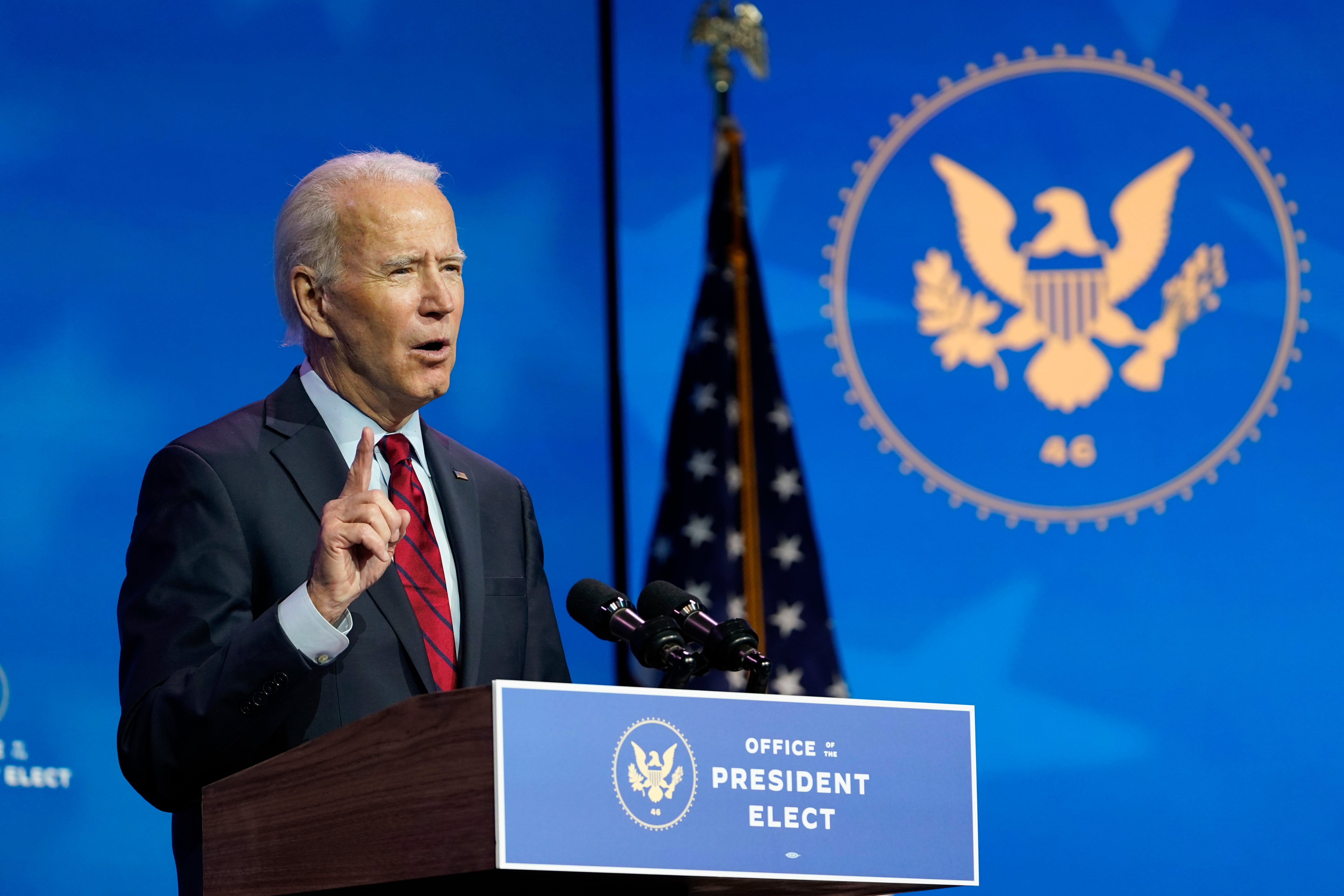The Latest: Biden vows 100 million shots in first 100 days
President-elect Joe Biden is promising to distribute a coronavirus vaccine to 100 million people during the first three months of his incoming administration, pledging “100 million shots in the first 100 days.”

Your support helps us to tell the story
From reproductive rights to climate change to Big Tech, The Independent is on the ground when the story is developing. Whether it's investigating the financials of Elon Musk's pro-Trump PAC or producing our latest documentary, 'The A Word', which shines a light on the American women fighting for reproductive rights, we know how important it is to parse out the facts from the messaging.
At such a critical moment in US history, we need reporters on the ground. Your donation allows us to keep sending journalists to speak to both sides of the story.
The Independent is trusted by Americans across the entire political spectrum. And unlike many other quality news outlets, we choose not to lock Americans out of our reporting and analysis with paywalls. We believe quality journalism should be available to everyone, paid for by those who can afford it.
Your support makes all the difference.The Latest on President-elect Joe Biden (all times local):
2:20 p.m.
President-elect Joe Biden is promising to distribute a coronavirus vaccine to 100 million people during the first three months of his incoming administration pledging “100 million shots in the first 100 days.”
At an event from Delaware to introduce his pandemic response team on Tuesday, Biden laid out his top three priorities for the start of his new government. He repeated his previous calls for all Americans to wear masks for 100 days to prevent the spread of the virus and said he’d mandate doing so in federal buildings and on public transportation, while also making the new promise to distribute 100 million vaccines shots over the same period.
Biden also said he believed that the virus can be brought under enough control to reopen “the majority of schools” within his first 100 days.
Those pledges came even as Biden struck a somber tone about the toll the coronavirus has already taken. He said that, after about nine months of living with the pandemic, the U.S. is “at risk of becoming numb to its toll on all of us." The president-elect specifically noted the virus’s “disproportionate” effects on Americans of color, calling it a “mass casualty” for many minority groups.
___
HERE'S WHAT YOU NEED TO KNOW ABOUT PRESIDENT-ELECT JOE BIDEN'S TRANSITION TO THE WHITE HOUSE:
President-elect Joe Biden will nominate retired four-star Army general Lloyd J. Austin to be secretary of defense, according to four people familiar with the decision. If confirmed by the Senate, Austin would be the first Black leader of the Pentagon.
Read more:
— Safe harbor law locks Congress into accepting Biden’s win
— Trump thought courts were key to winning, but judges disagreed
— Feds passed up chance to lock in more Pfizer vaccine doses
— Becerra’s big challenge: Vaccinating Americans against the coronavirus
— Biden’s health team offers glimpse of his COVID-19 strategy
___
HERE'S WHAT ELSE IS GOING ON:
2:05 p.m.
The Joint Congressional Committee on Inaugural Ceremonies is being prevented from publicly announcing its plans for President-elect Joe Biden’s inauguration on Jan. 20.
That’s according to House Majority Leader Steny Hoyer, who said Republicans on the panel blocked his resolution Tuesday that would let the public know that planning is underway with COVID-related health and safety protocols.
Hoyer called the Republican refusal to accept the outcome of the election “astounding" and said it was “continued deference to President Trump's post-election temper tantrums.”
On Tuesday, the panel’s three Republicans — Senate Majority Leader Mitch McConnell, House Republican leader Kevin McCarthy and Missouri Sen. Roy Blunt -- blocked the resolution from Hoyer. The two other Democrats, Speaker Nancy Pelosi and Minnesota Sen. Amy Klobuchar, voted in favor.
Blunt says, "It is not the job of the Joint Congressional Committee on Inaugural Ceremonies to get ahead of the electoral process and decide who we are inaugurating.”